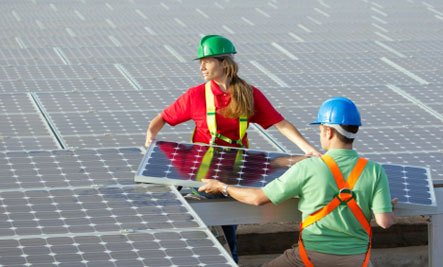
With the economy tanking and unemployment skyrocketing, where are the green jobs?
What is a green job?
According to the United Nations Environment Program a green job would be “work in agricultural, manufacturing, research and development, administrative, and service activities that contribute(s) substantially to preserving or restoring environmental quality.”
Can green jobs help our ailing economy and bring us closer to a cleaner future?
The Rocky Mountain Institute says, “Efficient energy use and clean energy production are the foundation of a market-based, cost-effective pathway for American businesses to out-innovate competitors, revitalize the economy, boost exports, and ultimately, create jobs.”
Check out this great infographic that shows how to gain this without oil, coal, nuclear energy, one-third less natural gas, and no new inventions.
In a recent post I wrote about the TRAIN Act bill that will be voted on in the next few days and could block the EPA’s proposed standards to control mercury and power plant pollution, a commenter said, “Killing jobs? Why can’t there be greener jobs?” Well, there are green career paths, and that might be just what our planet needs (and also our bank accounts).
Top 10 Green Jobs (adapted from this Fast Company article)
1. Farmer
America has only two million farmers, and their average age is 55. Since sustainable agriculture requires small-scale, local, organic methods rather than petroleum-based machines and fertilizers, there is a huge for more farmers and related workers such as: urban gardeners, farmers market and CSA coordinators, and artisanal cheesemakers.
2. Forester
Modern forestry is a complex combination of international project finance, conservation and development. According to the World Bank, a staggering 1.6 billion people depend on the forest for their livelihoods. Deforestation, which causes around a quarter of all global warming, is also likely to be a leading source ofcarbon credits worth tens of billions of dollars.
3. Solar Power Installer
Making and installing solar power systems already accounts for some 770,000 jobs globally. Installing solar-thermal water heaters and rooftop photovoltaic cells is a relatively high-paying job–$15 to $35 an hour–for those with construction skills. And opportunities are available all over the United States, wherever the sun shines.
4. Energy Efficiency Builder
Buildings account for up to 48 percent of US energy use and greenhouse gas emissions. LEED, the major green building certification, has over 43,000 accredited professionals. Greening the U.S. building stock will take not only skilled architects and engineers, but also a workforce of retrofitters.
5. Wind Turbine Fabricator
Wind is the leading and fastest-growing source of alternative energy with over 300,000 jobs worldwide. Turbines are 90% metal by weight, creating an opportunity for autoworkers and other manufacturers to repurpose their skills.
6. Conservation Biologist
The urgent quest to preserve the integrity of ecosystems around the world — and to quantify the value of — ecosystems services — leads to opportunities in teaching, research and fieldwork for government, nonprofits, and private companies.
7. Green MBA and Entrepreneur
A recent report by the U.S. Conference of Mayors, Mayors Climate Protection Center found that business services like legal, research and consulting account for the majority of all green jobs — over 400,000. This includes everything from marketing to the LOHAS (Lifestyles of Health and Sustainability) segment, to serving as a VP of sustainability within a large company.
8. Recycler
Although the market for paper and plastic has slowed down recently due to the economic downturn, demand for steel is still strong — 42 percent of output came from scrap in 2006 — and recycling remains the economical alternative to high disposal fees. There’s a need for specialized companies that can close the loop by recycling and repurposing e-waste, clothing, plastic bags, construction waste, and other materials.
9. Sustainability Systems Developer
The green economy needs a cadre of specialized software developers and engineers who design, build, and maintain the networks of sensors and stochastic modeling that underpin wind farms, smart energy grids, congestion pricing and other systems substituting intelligence for natural resources.
10. Urban Planner
Urban and regional planning is a linchpin of the quest to lower America’s carbon footprint. Strengthening mass transit systems, limiting sprawl, encouraging use of bicycles and de-emphasizing cars is only part of the job. Equally important is contingency planning, as floods, heat waves and garbage creep and become increasingly common problems for metropolises.

0 comentarios:
Publicar un comentario